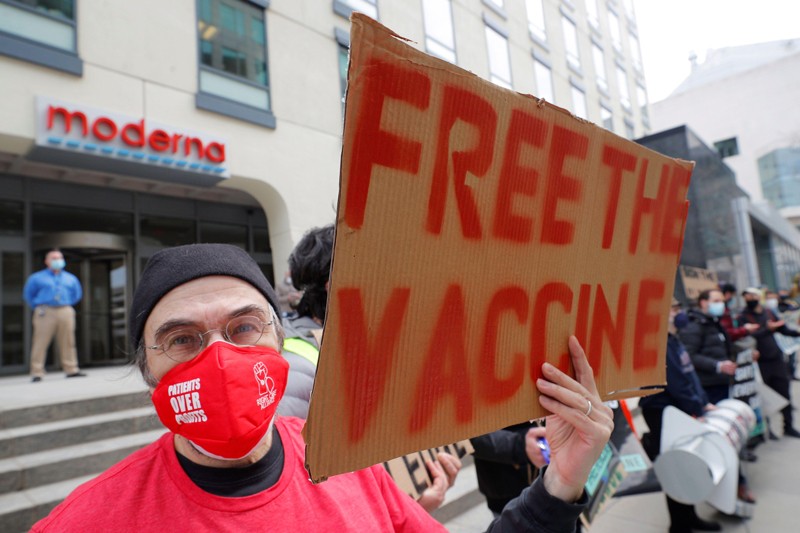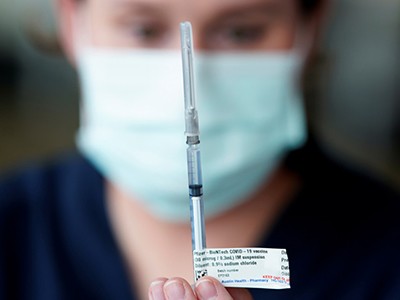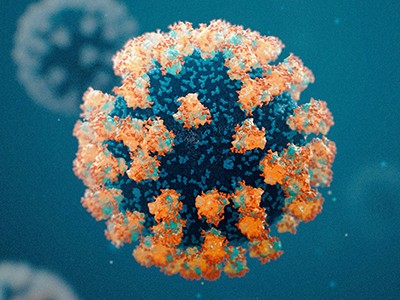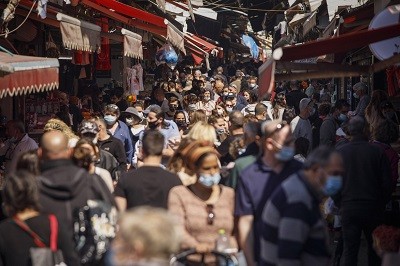The world needs around 11 billion doses of coronavirus vaccine to immunize 70% of the world’s population, assuming two doses per person. As of last month, orders had been confirmed for 8.6 billion doses, a remarkable achievement. But some 6 billion of these will go to high- and upper-middle-income countries. Poorer nations — which account for 80% of the world’s population — so far have access to less than one-third of the available vaccines.
One reason for this imbalance is that wealthier countries have been able to place substantial advance orders with the relatively small group of companies that are making vaccines, most of which are based in richer countries. Unless manufacturing and supply can be distributed more evenly, researchers forecast that it will be at least another two years before a significant proportion of people in the lowest-income countries are vaccinated.
This is why around 100 countries, led by India and South Africa, are asking fellow World Trade Organization members to agree a time-limited lifting of COVID-19-related intellectual-property (IP) rights. The main vaccine suppliers, they argue, should share their knowledge so that more countries can start producing vaccines for their own populations and for the lowest-income nations.
This idea needs to be considered seriously because a temporary IP waiver could have a role in accelerating the end of the pandemic. It would also send a powerful message from richer countries and pharmaceutical companies that they are willing to forgo some profit for the greater good. The campaign for a temporary IP waiver is called the People’s Vaccine and is backed by non-governmental organizations, as well as the United Nations’ HIV/AIDS agency, UNAIDS. Its proponents point out that many companies have already benefited from billions of dollars in public funding, through both research and development and advance purchase agreements. And that once the pandemic is over, IP protections would be restored.
But the pharmaceutical industry, richer nations and some researchers argue that temporary relief from patents won’t necessarily speed up manufacturing or supply. They say it isn’t clear whether the world has any spare manufacturing capacity. Even if patents did not apply, securing all the vaccine components, setting up factories, training people and passing relevant laws — all essential to vaccine delivery — could take more than a year.
An alternative to the lifting of IP, they say, is for companies to increase the licensing of their product designs in exchange for payment. This would allow vaccines to be made by many more companies. In addition, the World Health Organization is setting up a facility for companies to share their vaccine technology, skills and other know-how.
Companies and richer countries also note that they are already backing a vaccine scheme called COVAX, which has secured more than 1 billion doses towards a 2 billion target for 2021 to vaccinate 20% of the most vulnerable groups in countries in need of help. However, it’s not clear whether COVAX will be able to reach its full potential before some of the richer countries that are donating supplies have fully vaccinated their own people.
Richer nations were united in their opposition to the IP waiver until last week, when it emerged that the administration of US President Joe Biden is discussing its merits. One factor that could influence a change in policy is that the US government is named on a patent application for a technology used in vaccines being made by several companies, including Moderna in Cambridge, Massachusetts.
In 2016, researchers at the US National Institute of Allergy and Infectious Diseases in Bethesda, Maryland, working with colleagues at Dartmouth College in Hanover, New Hampshire, and the Scripps Research Institute in La Jolla, California, filed a patent for a technology that manipulates the spike protein found in coronaviruses, and which can be used to develop a vaccine antigen. The United States could license this technology — or choose not to enforce the patent — once the patent is granted.
Arguably the strongest argument for a temporary waiver is that patents were never designed for use during global emergencies such as wars or pandemics. A patent rewards inventors by protecting their inventions from unfair competition for a limited time. The key word here is ‘competition’. A pandemic is not a competition between companies, but a race between humanity and a virus. Instead of competing, countries and companies need to do all they can to cooperate to bring the pandemic to an end.
There is a precedent for this, says Graham Dutfield, who studies IP in the life sciences at the University of Leeds, UK. During the Second World War, the US government asked companies and universities to collaborate to scale up penicillin production, which was needed to protect soldiers from infectious diseases. Companies could have argued that this would affect profits, but they understood the necessity of subordinating their interests to the larger goal of saving lives and bringing the war to an end. “For a time the US produced virtually all the penicillin there was,” Dutfield says. “But companies did not sue each other for patent infringement and no one had any desire to hold the world to ransom by charging exorbitant prices.”
The fact that the current US administration is now considering the merits of an IP waiver is important, and other countries should do the same. It might not be the best or the only way to rapidly expand vaccine supply, but it does represent an important principle. There are times when competition helps research and innovation; there are also times when it needs to be set aside for the greater good.
"time" - Google News
March 30, 2021 at 09:37PM
https://ift.tt/3m550D3
It's time to consider a patent reprieve for COVID vaccines - Nature.com
"time" - Google News
https://ift.tt/3f5iuuC
Shoes Man Tutorial
Pos News Update
Meme Update
Korean Entertainment News
Japan News Update
Bagikan Berita Ini


















0 Response to "It's time to consider a patent reprieve for COVID vaccines - Nature.com"
Post a Comment